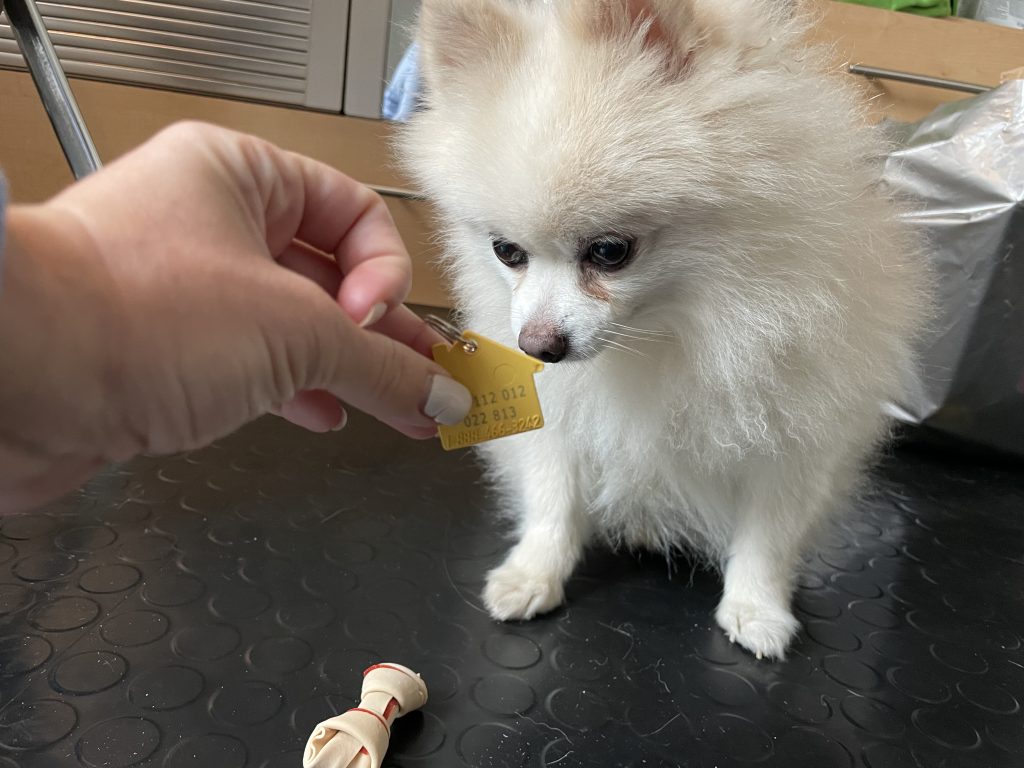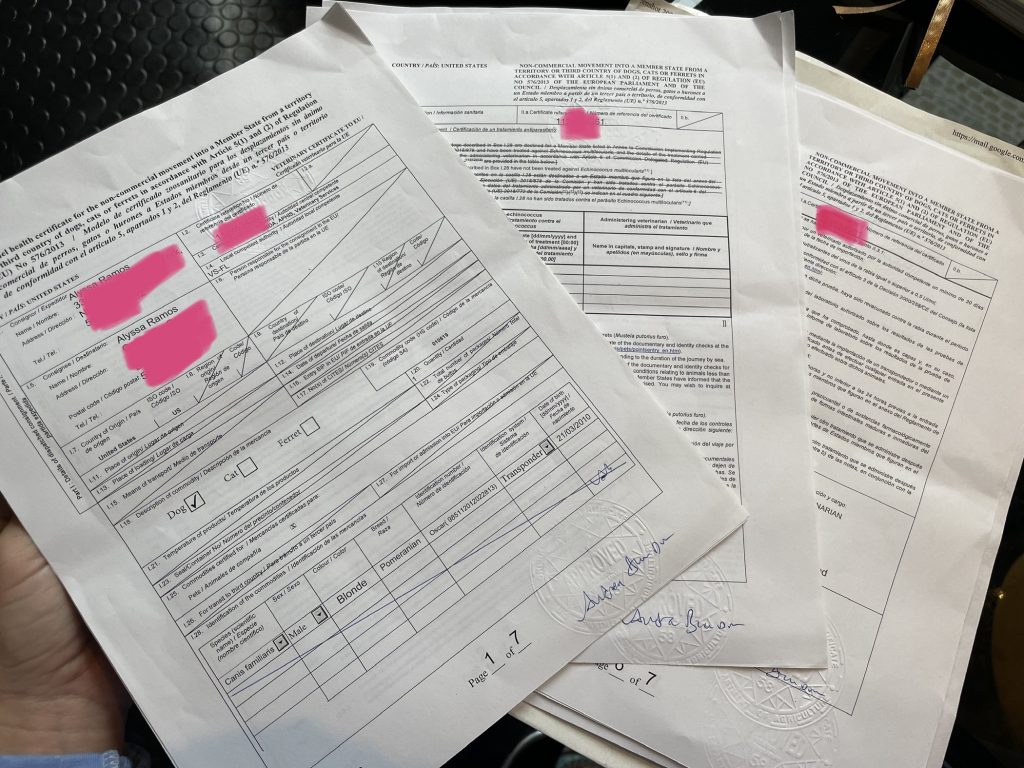
If you’re wondering how to travel with your pet from USA to Europe in 2022, you’ve come to the right place! Recently I brought my Pomeranian, Oscar, first to Barcelona, and then to Paris! (He has also been to Mexico and El Salvador!)
In the grand scheme of how the entry process went, it now seems like it was pretty easy. It was the paperwork beforehand that was ridiculous and left me almost having a panic attack the day I was supposed to travel.
But hopefully this post will help you! PLEASE NOTE, that my experience was getting my dog into SPAIN. You need to make sure you follow the instructions for the country you are entering initially from a non-EU country (including the UK), however they are all pretty much the same.
Also, a big shout out to one of my besties, Jenny Chu (@iheartjennychu) who did this process with her dog and shared her post with me that helped A LOT!
Alright, let’s make this easy for you!
Jump To:
For Starters: Timing is EVERYTHING so Vet Make Appointments in Advance

Depending on if your pet has an up to date rabies and microchip, you may need TWO veterinary appointments; one 21 days or more before departure, and one within 10 days of departure.
Why 21 days before: IF your pet doesn’t have an up to date rabies vax, or an up to date microchip, you need to get a rabies vax a minimum of 21 days before the trip. But you cannot get the health form during this visit… because…
Why within 10 days of departure? The entry rules state that you must get the EU Health Certificate filled out by a vet withing 10 days of departure…this also includes having to send it to the USDA for approval (the vet sends it), and getting it sent back.
My papers arrived 1 hour before I had to leave for my flight. So be prepared, and MAKE APPOINTMENTS, plus follow up! My vet also filled the form out wrong which delayed the paperwork by several days!
1. Your Pet MUST Have an Approved Microchip

First things first, your pet must have an “ISO 11784/11785 compliant 15 digit microchip”.
- If your pet has a microchip, but you’re not sure if it’s compliant, count the digits to see if there’s 15. If you don’t have them on file, take them to the vet, ask them to scan it, then check, and also write down the number.
- If your pet doesn’t have a microchip, or has one that’s not the new 15 digit one, you’ll need to get a new one put in. Oscar’s was out of date, so he got a new one for about $30, and lots of treats after the big needle!
Be sure to REGISTER your information online with the corresponding microchip company! It will include your contact info and also the pet’s rabies info, which is another requirement. (Note: there is typically a yearly fee for it but it’s required anyway).
2. How to Travel With Your Pet From USA to Europe: Up to Date Rabies Vaccination

Read this part carefully, because it’s when all of the timing requirements happen which is essential for how to travel with your pet from USA to Europe.
- If your pet is up to date on its rabies vaccination, and it won’t expire during the duration of your trip in Europe, AND you have a 15 digit microchip, you don’t need to do anything else for the rabies vax part, and you can just schedule an appointment within 10 days of departure.
- If your pet is up to date on its rabies vaccination, and it won’t expire during the duration of your trip in Europe, BUT you don’t have the 15 digit microchip: they must get ANOTHER rabies vaccination first AND THEN a new microchip after the vax (so that it can get recorded on the microchip), and the vax must be given a minimum 21 days before your departure.
- If your pet does not have a rabies vaccine, or it’s going to expire soon, the same rules apply as above. It must be given 21 days or more before your departure
Make sure to get printed copies of all of your pets vaccines even though they’re on the microchip and will be written on the EU Health Certificate, just in case!
NOTE: If you are not coming from the US, and are coming from a “high risk rabies area”, you’ll need to also do a “rabies tier test” 30 days after the rabies vaccination. Click here for high risk countries.
3. Non-Commercial EU Health Certificate for Your Destination Country Within 10 Days of Departure

And now for the somewhat hard part. You must get an EU Health Certificate for your destination country filled out by your vet within 10 days of departure. And as I mentioned, it must also be sent to the USDA for approval, then sent back to you.
So, I’m going to make this as easy as possible given the experiences I had with two vets:
- Call your vet and tell them you need the EU Health Certificate for (let’s say) Spain. *They should have access to all the health forms for each country*. The form is pretty much the same for each country in EU as well, except it is TRANSLATED to that country’s language, which is MANDATORY.
- Once they confirm, schedule an appointment withing the 10 days…obviously I would recommend doing it 10 days out, just in case there’s a problem like there was for me.
- Take your pet in and they’ll fill out the form, then THEY will send it to USDA, with a return label that will be sent back to YOU. You will pay around $200 for the entire process, which includes the form and the postage to get it sent to and from the USDA.
- Once you have your paperwork back from USDA, have a glass of wine, because the hard parts are over!
IMPORTANT NOTE: This EU Health Certificate is valid for 4 months in ANY EU (Schengen) country! You do NOT need to get an EU Pet Passport if you’re planning on only staying for a short time period, but if you’re staying longer or planning on coming back, I’ll explain how to get one below!
4. How to Travel With Your Pet from USA to Europe as In-Cabin Pet

Unless you’re moving to Europe permanently, I really wouldn’t advise traveling with a dog that can’t go in cabin with you. It’s extremely dangerous and traumatic for them!
But if you’re planning on taking them in-cabin on the airline, here’s some thing you need to consider:
- ALWAYS research to make sure the airline even allows pets!
- Check to make sure the airline has enough room for your pet. Some airlines only permit a certain number of in-cabin pets per flight.
- Check to see if there’s a weight restriction. Some airlines only permit pets that are 8kg and under INCLUDING the carrier.
- Check the carrier requirements. Most need to be a certain dimension and able to fit under your seat.
- Check how much it is. Usually it’s cheaper internationally!
- Always reserve their spot in advance, DO NOT just show up at the airport expecting to add them
- Map out if there’s any doggy relief areas in the airport, and be sure to walk them before the flight
- Keep in mind that the altitude also bothers their ears. Consider a safe treat or toy they can chew on to alleviate the pressure!
5. Checking in With Your Pet at the Airport
My airline (United) actually had an entirely different check in line for people with pets and unaccompanied minors! It made the process a lot less stressful!
Find out ahead of time if your airline offers that, if not, just go to the regular line with your pet.
Have their paperwork prepared to show the agent, weigh them if necessary, and you’re good to go!
6. Arriving in Europe with Your Pet!

Once you’ve landed, congratulations! You made it to Europe with your pet! Now all you have to do is get their microchip scanned and their EU Health Certificate checked at customs.
If you’re not sure where that is, you can’t miss it, it’s where you exit after baggage control. And regardless, a security officer will see your pet and stop you anyway.
I actually had a really great experience entering Spain with Oscar! Not only did the security officers at the passport control let me skip the whole line because I had a dog, but the customs officer even gave Oscar a treat while he scanned his microchip!
7. Do You Need an EU Pet Passport to Travel to Other Countries in Europe?
If you’re planning on hopping around to other countries in Europe with your pet, the good news is that you can use the EU Health Certificate you used to enter for other countries, for up to 4 months.
If you’re planning on staying longer than that, or planning to return in the future, you may want to just get an EU Pet Passport.
How to get an EU Pet Passport:
- Make an appointment at a local veterinarian in the country you’re in. If you don’t speak the local language, you may want to Google to see if there are any that speak English, or use Translate to make an appointment online.
- Bring your EU Health Certificate and your pet’s vaccination records
- You’ll likely need to pay for another evaluation (around $100) and then the Pet Passport is only about $20 and is good for life!
8. Tips Traveling in Europe with a Pet

So far Oscar and I have only been to Barcelona and Paris in Europe, but both of those places have been extremely pet friendly! There’s tons of outdoor seating, but a lot of restaurants will even let them inside! I also haven’t had an issue accommodations either!
Here’s some tips for traveling in Europe with a pet, if you’d like me to go more in-depth, please drop me a comment and I’ll write another post!
- Use the filter for “pet-friendly” when searching for accommodations. It’s easy to find on sites like Booking.com and Hotels.com. If using AirBnB, under “guests” there’s actually now an option for pets!
- If you’re using Uber to get around, there’s also now an option for “Uber Pets”. It costs more, but some Ubers will actually deny you if you don’t use it. For taxis, if using an app, try to tell them you have a pet. Some also get mad about it.
- There’s plenty of restaurants with outdoor seating, but if you want to sit inside, call ahead and ask.
- Please pick up your dog’s poo. Preferably with biodegradable bags that you can get online or any local pet store.
- To find a vet, simply type “veterinarian” in the local language on google maps. From the information page on there, you can also see if you can make an appointment online, or send an email.
- There are TONS of pet stores with high quality food, treats, and anything else you might need!
9. Returning from Europe to USA with your Pet
Great news! You don’t need anything to get back into the USA from Europe with your pet as long as the rabies vaccine is still valid. Be sure to bring all of your paperwork, just in case though!
10. Puppies and Pets in Cargo
Unfortunately you cannot bring puppies 12 weeks or younger into Europe, because they aren’t old enough to get a rabies vaccine. Once they’re old enough for the rabies vax (usually 6 months), you can go.
If you want to travel with pets in cargo, you’ll need to do all of the above, and then check with the airline to see what their additional protocols are.
11. Emotional Support Animals
While the USA no longer accepts Emotional Support Animals for free on airlines, some of the European ones do! This means you don’t have to pay a fee, and your pet doesn’t have to stay in its carrier.
Please only get your pet certified if it really is an emotional support animal. Many people abuse this privilege and make it harder for the people who actually need them to get this service. For info on how to get ESA certified, see this post.
Oscar and I are loving living in Europe for a few months, and I’m so happy I was able to bring him here! If you have any questions or additional tips, please leave a comment below!
If you want to follow “Alyssa and Oscar in Paris” be sure to follow me on IG! @mylifesatravelmovie
Please don’t forget! I work extremely hard to produce these free travel guides and posts! If it helped you, or you enjoyed it, PLEASE give it a share on social media, and follow me to keep up with more posts! You’re two minutes of effort truly helps keep my business running! Thank ya!
xx, Alyssa






I’m traveling to Spain in May with my service dog and I’m a nervous wreck. Plz help me with what I have to do and have. Thank you
Hi! I have written out how everything you need to know in this post! Do you have a question about what I have written?
Hi! This was so so helpful, and I will definitely be sharing! Out of curiosity, how long did it take to get the EU Pet Passport? Was it ready same-day, or did you have to wait for it?
THanks for reading!! They gave it to me at the appointment! They have blank ones at the office and they just fill it out by hand, but maybe call or email first in case they need to order more!
Alyssa, thank you for the excellent and detailed travel experience. Did you need to undergo tapeworm treatment within 24 to 120 hours of entering Europe?
Hi! No,not tapeworm, just the regular prevention for fleas and heartworms — you can give it to them in front of the vet or usually they’ll let you just tell them when you gave them the pill!
Thank you for sharing your experience. This by far was one of the most thorough guidance. I do have one question if you can go in depth. Where is the best and easiest EU country to get an EU pet passport? I’ve read so many blogs that require specific documents such as visa, permanent residence, proof of residency, etc
Hi Anne! I didn’t need anything from my human end to get the pet passport! I’ve only done it in France so I can’t really give other input, but I know the process is the same in Spain, you just need to show the pet’s paperwork!
Hi, thanks for this write-up. What is the benefit of getting the EU passport for a US-based dog? Is it because we don’t need to get the EU health certificate next time we bring the dog from US to EU?
The benefit is that you don’t have to re-do the US paperwork if you go back, and also the US paperwork is only valid for a couple weeks in EU, so if you’re staying longer, the passport works for life!